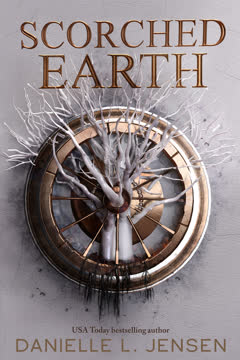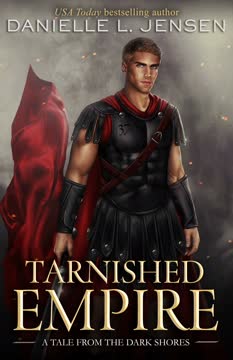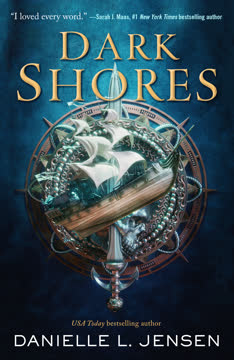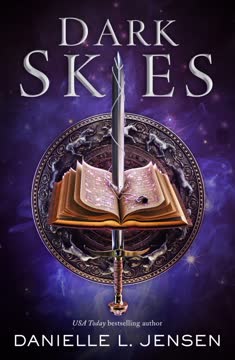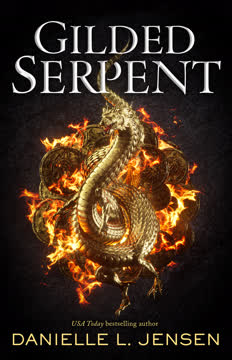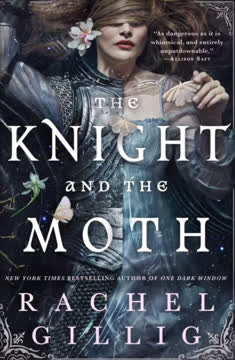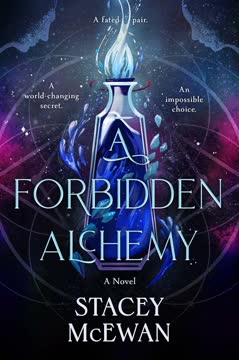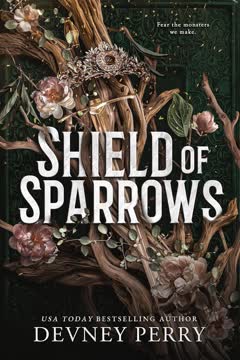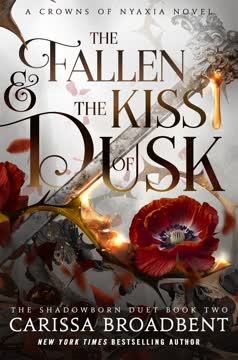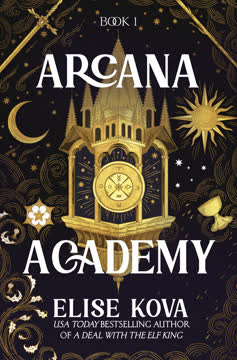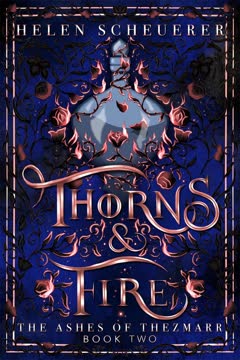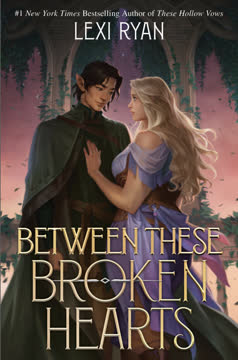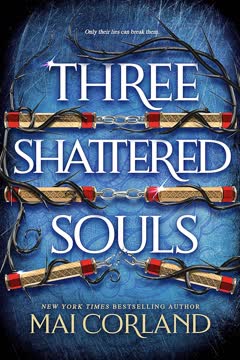Plot Summary
Shadows Over Deadground
The story opens with Mudamora and its allies beset by two unstoppable forces: the blight, a supernatural plague that turns the living into mindless puppets, and the relentless Celendor Empire, whose legions march with mechanical precision. Lydia, marked by the goddess Hegeria, and Killian, a general haunted by guilt, race to find a way to destroy the blight at its source—Deadground. The land is scarred, hope is thin, and every step forward is shadowed by the threat of betrayal, both from within and without. The fate of the world hinges on a handful of broken heroes, each carrying the weight of impossible choices.
The Price of Loyalty
As the blight spreads and the Empire advances, the bonds between friends, lovers, and comrades are tested to their limits. Marcus, the legatus of the Thirty-Seventh, is torn between duty to his men and the blackmail that binds him to Cassius, the Empire's dictator. Teriana, once a captive, now a reluctant leader, must choose between saving her people and unleashing devastation on the world. Loyalty becomes a double-edged sword: to save one, another must be sacrificed. Every character is forced to confront what—and who—they are willing to betray for the greater good.
Blight and Betrayal
The blight is not just a physical threat but a metaphor for the corruption infecting hearts and nations. Rufina, the corrupted queen, manipulates the blight and the dead, while Cassius manipulates the living through fear and power. Lydia's struggle with the Corrupter's influence mirrors the larger war: the temptation to give in, to take the easy path, to become the monster to defeat the monster. Betrayals—personal and political—fracture alliances, and the line between friend and foe blurs.
The Corrupter's Claws
Lydia's battle is as much internal as external. The Corrupter's voice whispers in her mind, promising strength and freedom from pain if she surrenders. Killian, too, faces his own darkness, haunted by the lives he's taken and the ones he couldn't save. Marcus, manipulated by Cassius and the Corrupter alike, finds his will eroding. The gods themselves intervene, but their help comes at a price: the freedom to choose, and the burden of living with those choices.
Allies and Enemies
As the world fractures, new alliances are forged. The Maarin, long neutral, are drawn into the war by Teriana's desperate gambit. Agrippa, once Marcus's right hand, now fights for Mudamora. The giants of Eoten Isle and the shifters of Anukastre join the fray. Yet every alliance is fragile, built on necessity rather than trust. The enemy of my enemy is my friend—until the tides turn. The cost of unity is high, and the threat of betrayal never fades.
The Queen's Sacrifice
The only hope to destroy the blight lies with Malahi, the true queen of Mudamora, and Lydia's healing gift. Together, they descend into Deadground, where Malahi must sacrifice herself to reverse the blight's flow. Lydia, refusing to let her friend die alone, channels the life of thousands to keep Malahi alive. The act is both miracle and tragedy: the blight is vanquished, the dead are restored, but the scars—physical and emotional—remain. The world is saved, but not without loss.
The Maarin's Gambit
Teriana, now triumvir of the Maarin, orchestrates a global rebellion. Ships strike at the Empire's supply lines, destroying the xenthier paths that allow the legions to move and resupply. The cost is enormous—lives lost, cities flooded, allies sacrificed—but the Empire is finally put on the defensive. For the first time in generations, the invincible legions taste defeat. Yet victory is hollow, as Teriana is left to question whether the ends justified the means.
The Fall of Revat
The Empire's siege of Revat, aided by Rufina's blight, is a turning point. The city's god towers fall, the library is sacked, and the Maarin's last hope for knowledge nearly lost. Kaira, Gamdesh's greatest general, dies a martyr, and the city's fall signals the end of the old world. Yet in the ashes, new alliances are born, and the seeds of rebellion take root.
The Legion's Reckoning
Cut off from supply, betrayed by Cassius, and haunted by the deaths of his men, Marcus finally turns against the Empire. He confesses his crimes—his role in Lydia's attempted murder, his complicity in Cassius's rise—and surrenders himself to justice. The Thirty-Seventh, once the Empire's blade, becomes its conscience. The legions march not for conquest, but for liberation, turning their swords against the tyrants who made them monsters.
The Last March
The legions return to Celendrial, not as conquerors but as avengers. Marcus, stripped of his rank and marked for death, leads his men in one final march. The city, long complacent, rises in revolt. The Senate is overthrown, Cassius is executed, and the Empire is reborn as a republic. Yet the cost is high: Marcus, the architect of so much suffering, chooses to pay with his life.
Justice in Celendrial
Marcus's execution is both justice and tragedy. Teriana, Lydia, and Killian watch as the man they loved and hated is hanged alongside Cassius. The city celebrates, but for those who knew Marcus's heart, the victory is bittersweet. Lydia, using her healing gift, secretly revives Marcus, giving him a second chance—but only if he can find a way to live with himself.
The Weight of Forgiveness
In the aftermath, the survivors struggle to find peace. Lydia and Killian, scarred but together, choose to serve the people rather than rule them. Teriana, refusing the mantle of leadership, seeks a quieter life with Marcus, both of them forever changed by what they've done and what they've lost. Forgiveness is not easily given, nor easily accepted, but it is the only path forward.
The End of Empire
The Empire is gone, replaced by a fragile republic. The gods are silent, their marks now a reminder of both the world's salvation and its near destruction. The Maarin, the giants, the shifters, and the survivors of Mudamora and Gamdesh look to rebuild. The scars of war remain, but so does hope. The world is changed, but not ended.
The Cost of Victory
Every victory has come at a price: friends lost, innocence destroyed, and the knowledge that peace is always temporary. The survivors carry their scars—some visible, some hidden—but they also carry the memory of what they fought for. The world is not healed, but it is alive, and that is enough.
New Dawn, Old Scars
As the sun rises over a battered world, Lydia, Killian, Teriana, and Marcus (now in hiding) look to the future. They are no longer heroes or villains, but people—flawed, wounded, and determined to live. The gods are silent, but the world endures. The story ends not with triumph, but with the quiet promise that, even after the worst darkness, dawn will come.
Characters
Lydia (Kitaryia Falorn)
Lydia is the heart of Mudamora's resistance, marked by Hegeria and twice-touched by the gods. Her journey is one of self-mastery: from a frightened girl haunted by the Corrupter's whispers to a woman who faces down evil and chooses compassion over vengeance. Her relationship with Killian is both anchor and crucible, forcing her to confront her own darkness and the cost of love in a world at war. Lydia's greatest strength is her refusal to give up on anyone—not even herself. Her arc is one of sacrifice, forgiveness, and the quiet heroism of healing rather than destroying.
Killian Calorian
Killian is a man defined by guilt and duty. Marked by Tremon, he is both a brilliant tactician and a man tormented by the lives he's taken and the ones he couldn't save. His love for Lydia is fierce and unwavering, but it is also a source of pain, as he must learn to let her fight her own battles. Killian's journey is about learning to forgive himself, to accept that he cannot save everyone, and to find hope in the ashes of defeat. His loyalty is his greatest virtue and his greatest flaw.
Marcus (Gaius Domitius)
Marcus is the most complex figure in the story: a man who has done monstrous things for what he believed were good reasons. Blackmailed by Cassius, manipulated by the Corrupter, and driven by a desperate need to protect his family and his men, Marcus is both architect of the Empire's horrors and its ultimate redeemer. His arc is one of atonement: he confesses his crimes, surrenders to justice, and chooses death over further complicity. Yet, through Lydia's intervention, he is given a second chance—not to rule, but to live. His relationship with Teriana is both a love story and a tragedy, defined by impossible choices and the hope of forgiveness.
Teriana
Teriana is the soul of the Maarin and the story's moral compass. Forced into leadership by circumstance, she is haunted by the cost of her choices—lives lost, friends betrayed, and the knowledge that victory is never clean. Her love for Marcus is both her greatest strength and her greatest vulnerability, forcing her to confront the limits of forgiveness. Teriana's arc is about learning to let go of power, to trust others, and to find peace in a world that will never be perfect.
Malahi Rowenes
Malahi is the true queen of Mudamora, marked by Yara and destined to sacrifice herself to save her people. Her journey is one of suffering and resilience: tortured by Rufina, scarred in body and soul, she nonetheless chooses to give everything for the greater good. Her death (and miraculous return) is the turning point in the war against the blight, and her legacy is one of hope and unity.
Rufina (Cyntha)
Rufina is the story's primary antagonist, a woman consumed by bitterness and the Corrupter's power. Her manipulation of the blight and the dead is both literal and symbolic: she is what happens when pain is allowed to fester into hate. Her defeat at Lydia's hands is both a victory over evil and a warning of what happens when vengeance becomes the only goal.
Cassius
Cassius is the architect of the Empire's tyranny, a man who uses blackmail, murder, and fear to achieve his ends. He is both a product and a perpetuator of the system's corruption. His execution is both justice and catharsis, but his legacy lingers in the scars he leaves behind.
Agrippa
Once Marcus's right hand, Agrippa becomes a symbol of the possibility of change. His love for Malahi and his willingness to fight for the right side, even at the cost of his own life, make him a linchpin in the alliance against the Empire. His arc is about redemption, loyalty, and the courage to choose a new path.
Felix
Felix is Marcus's oldest friend and the voice of reason in the chaos. He is the one who holds the Thirty-Seventh together when Marcus falters, and his loyalty is both a blessing and a burden. Felix's arc is about learning to lead, to forgive, and to carry on after loss.
Bait
Bait is the story's heart: a man who loves Teriana, fights for his people, and suffers the consequences of war. His journey is one of acceptance—of loss, of change, and of the need to let go of the past to build a better future.
Plot Devices
Duality of Light and Darkness
The narrative structure is built on the interplay between light and darkness, both in the world and within the characters. Lydia's struggle with the Corrupter's influence mirrors Marcus's battle with his own capacity for evil. The gods themselves are not saviors but forces that grant power and demand responsibility. The story uses foreshadowing—visions, dreams, and prophecies—to hint at the cost of power and choice and the inevitability of loss. The use of parallel plotlines (Lydia/Killian, Marcus/Teriana, Malahi/Agrippa) allows the reader to see how every choice ripples outward, affecting not just individuals but nations.
The Cost of Power and Choice
The story is structured around impossible choices: save the few or the many, betray a friend or a nation, fight for love or for duty. The xenthier paths are both literal and metaphorical: shortcuts that come with hidden dangers, connections that can be severed, and the means by which both salvation and destruction are delivered. The destruction of the paths is both a tactical victory and a symbol of the end of an era—the world is forever changed, and there is no going back.
Redemption and Atonement
The narrative uses confession, trial, and execution as both plot and theme: Marcus's public atonement is mirrored by Lydia's private struggle, Teriana's abdication of power, and Killian's acceptance of his own limits. The story is cyclical: every ending is also a beginning, and the scars of the past are both wounds and reminders of what was fought for.
Analysis
Scorched Earth is a sweeping, emotionally charged conclusion to a series that has always been about the cost of power and choice, the complexity of loyalty, and the possibility of redemption and atonement. In a world where gods are real but silent, and where every victory is paid for in blood, the novel asks what it means to be a hero—and whether heroism is even possible in a world built on conquest and suffering. The story refuses easy answers: forgiveness is hard-won, justice is imperfect, and peace is always temporary. Yet it is also a story of hope: that even after the worst darkness, people can choose to do better, to build something new from the ashes. The lessons are clear and timely: power must be held to account, the past cannot be erased but can be learned from, and the only way forward is together. In the end, Scorched Earth is less about the triumph of good over evil than about the messy, painful, and necessary work of healing—and the courage it takes to keep fighting for a better world, even when the odds seem insurmountable.
Last updated:
Review Summary
Scorched Earth receives overwhelmingly positive reviews, with readers praising its epic conclusion to the Dark Shores series. Fans appreciate the complex world-building, political intrigue, and character development. Many found the book emotionally intense and satisfying, though some felt Marcus's arc was particularly brutal. Readers highlight the themes of redemption, colonization, and war. While a few had minor criticisms, most agree it's a worthy finale that lives up to high expectations after a long wait.
